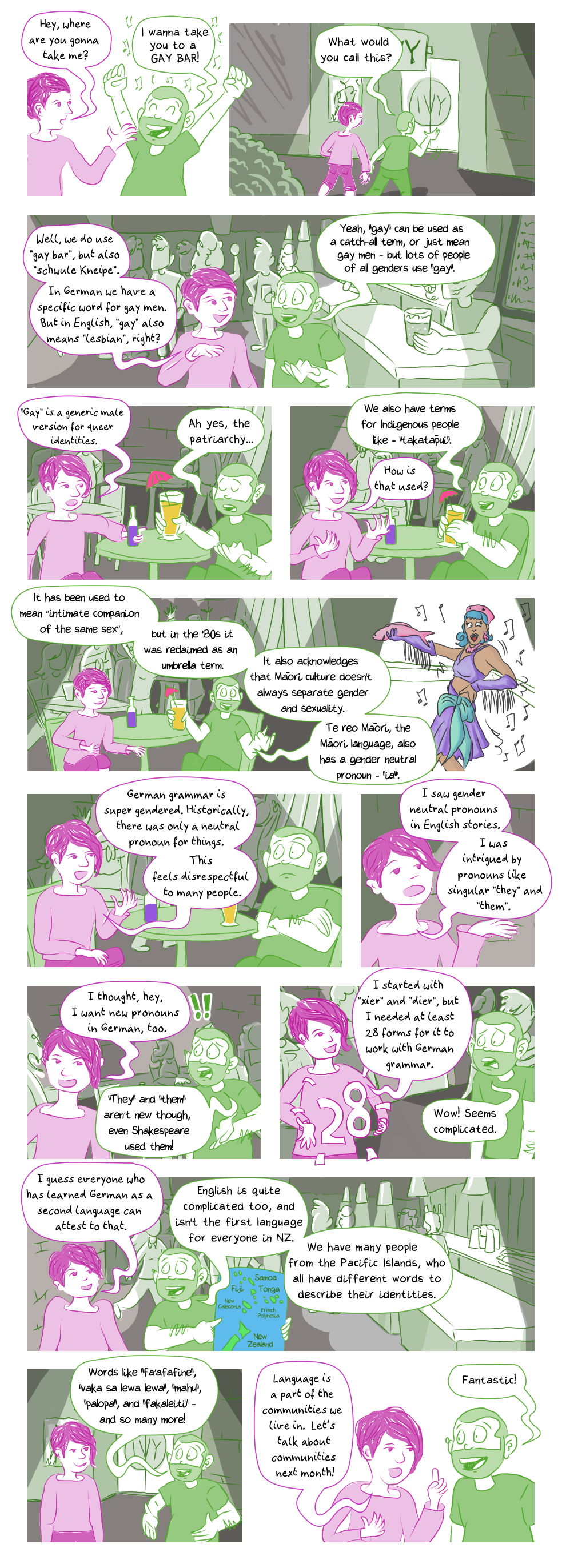August: Labels
Queer Comic Conversations is a webcomic series by Comic artists Illi Anna Heger (Munich) and Sam Orchard (Wellington) where they discuss similarities and differences about queer and trans lives.
Annotations
Please click for more information on xier pronouns, the gay bar visited in this episode, Pacific Island identity terms and the Takatāpui resources and Takatāpui organization “Tīwhanawhana”.TransCript
Illi: Hey, where are you gonna take me?Sam (singing): I wanna take you to a GAY BAR!
Sam and Illi stand in front of a day with a sign that reads "IVY".
Sam: What would you call this?
Inside the bar. A friendly bar tender and lots of diverse people.
Illi:
Well, we do use gay bar, but also "schwule Kneipe". In German we have a specific word for gay men. But in English, "gay" also means "lesbian", right?
Sam: Yeah, "gay" can be used as a catch-all term, or just mean gay men - but lots of people of all genders use "gay".
Illi and Sam are sitting on a table, chatting away.
Illi: "Gay" is a generic male version for queer identities.
Sam: Ah yes, the patriarchy...
Sam: We also have terms for Indigenous people like - "takatāpui".
Illi: How is that used?
Lively bar atmosphere and a performer on stage.
Sam: It has been used to mean “intimate companion of the same sex” but in the '80s it was reclaimed as an umbrella term. It also acknowledges that Māori culture doesn't always separate gender and sexuality. Te reo Māori, the Māori language, also has a gender neutral pronoun -"ia"'.
Illi: German grammar is super gendered. Historically, there was only a neutral pronoun for things. This feels disrespectful to many people.
I saw gender neutral pronouns in English stories. I was intrigued by pronouns like singular "they" and "them".
I thought, hey, I want new pronouns in German, too.
Sam: "They" and "them" aren’t new though, even Shakespeare used them!
Illi: I started with "xier" and "dier", but I needed at least 28 forms for it to work with German grammar.
Sam: Wow! Seems complicated.
Illi: I guess everyone who has learned German as a second language can attest to that.
Sam shows a map that illustrates the islands in the South Pacific.
Sam: English is quite complicated too, and isn't the first language for everyone in NZ. We have many people from the Pacific Islands, who all have different words to describe their identities. Words like "fa’afafine", "vaka sa lewa lewa", "mahu", "palopa", and "fakaleiti" - and so many more!
Sam: Words like "fa’afafine", "vaka sa lewa lewa", "mahu", "palopa", and "fakaleiti" - and so many more!
Illi: Language is a part of the communities we live in. Let’s talk about communities next month!
Sam: Fantastic!
back to July episode
forward to September episode
